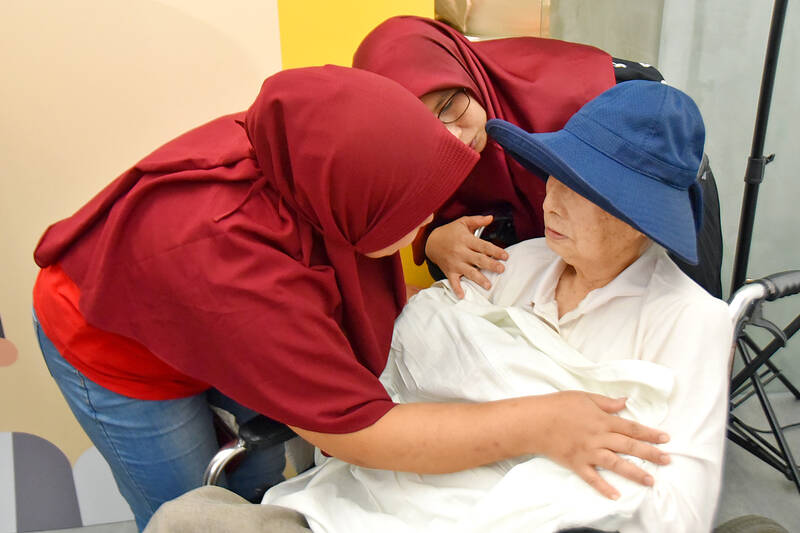Migrant worker support organization One-Forty has announced a partnership with Taipei City Hospital to provide online support and training for caregivers of people with dementia.
The number of people with dementia in Taiwan surpassed 320,000 last year, and with the nation set to become super-aged by 2025, the figure is expected to grow.
At the same time, one in every five dementia patients is cared for by a migrant worker, One-Forty said in a statement last week.

Photo: Wu Po-hsuan, Taipei Times
The non-profit organization has partnered with the Dementia Center at Taipei City Hospital to produce a free handbook and instructional videos, as well as the nation’s first online support network for foreign caregivers of dementia patients, the organization said.
Caregivers face three major obstacles in their work, One-Forty cofounder Kevin Chen (陳凱翔) said.
In a survey conducted this year, the group found that 80 percent of caregivers had encountered a language barrier, he said.
Sixty percent said they did not know where to obtain the skills and information needed to care for people with dementia, while another 60 percent were unfamiliar with the symptoms, he said.
Meanwhile, more than 90 percent of people with dementia exhibit behavioral or emotional issues such as sudden agitation or paranoia, he said.
If caregivers cannot recognize these symptoms and do not have access to information, it could easily result in misunderstandings or conflict, Chen said.
The educational materials organized by One-Forty and the center include information on dementia symptoms and tips for interacting with patients, as well as tips for caring for one’s own health in the process, Chen said.
To aid caregivers regarding their own mental health, One-Forty also organizes in-person workshops, as well as an online community for caregivers to help support one another, he added.
In the first phase of the program, One-Forty said it expects 3,000 downloads of the bilingual Chinese and Indonesian educational materials.
It also plans to expand to include Tagalog, Vietnamese and other language versions before 2026 so that all 60,000 foreign caregivers of people with dementia in Taiwan can receive assistance, the organization added.

ANOTHER EMERGES: The CWA yesterday said this year’s fourth storm of the typhoon season had formed in the South China Sea, but was not expected to affect Taiwan Tropical Storm Gaemi has intensified slightly as it heads toward Taiwan, where it is expected to affect the country in the coming days, the Central Weather Administration (CWA) said yesterday. As of 8am yesterday, the 120km-radius storm was 800km southeast of Oluanpi (鵝鑾鼻), Taiwan’s southernmost tip, moving at 9kph northwest, the agency said. A sea warning for Gaemi could be issued tonight at the earliest, it said, adding that the storm is projected to be closest to Taiwan on Wednesday or Thursday. Gaemi’s potential effect on Taiwan remains unclear, as that would depend on its direction, radius and intensity, forecasters said. Former Weather Forecast

As COVID-19 cases in Japan have been increasing for 10 consecutive weeks, people should get vaccinated before visiting the nation, the Centers for Disease Control (CDC) said. The centers reported 773 hospitalizations and 124 deaths related to COVID-19 in Taiwan last week. CDC Epidemic Intelligence Center Director Guo Hung-wei (郭宏偉) on Tuesday said the number of weekly COVID-19 cases reported in Japan has been increasing since mid-May and surpassed 55,000 cases from July 8 to July 14. The average number of COVID-19 patients at Japan’s healthcare facilities that week was also 1.39 times that of the week before and KP.3 is the dominant

The Chinese Communist Party’s (CCP) working group for Taiwan-related policies is likely to be upgraded to a committee-level body, a report commissioned by the Mainland Affairs Council (MAC) said. As Chinese President Xi Jinping (習近平) is increasingly likely to upgrade the CCP’s Central Leading Group for Taiwan Affairs, Taiwanese authorities should prepare by researching Xi and the CCP, the report said. At the third plenary session of the 20th Central Committee of the CCP, which ended on Thursday last week, the party set a target of 2029 for the completion of some tasks, meaning that Xi is likely preparing to

US-CHINA TRADE DISPUTE: Despite Beijing’s offer of preferential treatment, the lure of China has dimmed as Taiwanese and international investors move out Japan and the US have become the favored destinations for Taiwanese graduates as China’s attraction has waned over the years, the Ministry of Labor said. According to the ministry’s latest income and employment advisory published this month, 3,215 Taiwanese university graduates from the class of 2020 went to Japan, surpassing for the first time the 2,881 graduates who went to China. A total of 2,300 graduates from the class of 2021 went to the US, compared with the 2,262 who went to China, the document showed. The trend continued for the class of 2023, of whom 1,460 went to Japan, 1,334 went to